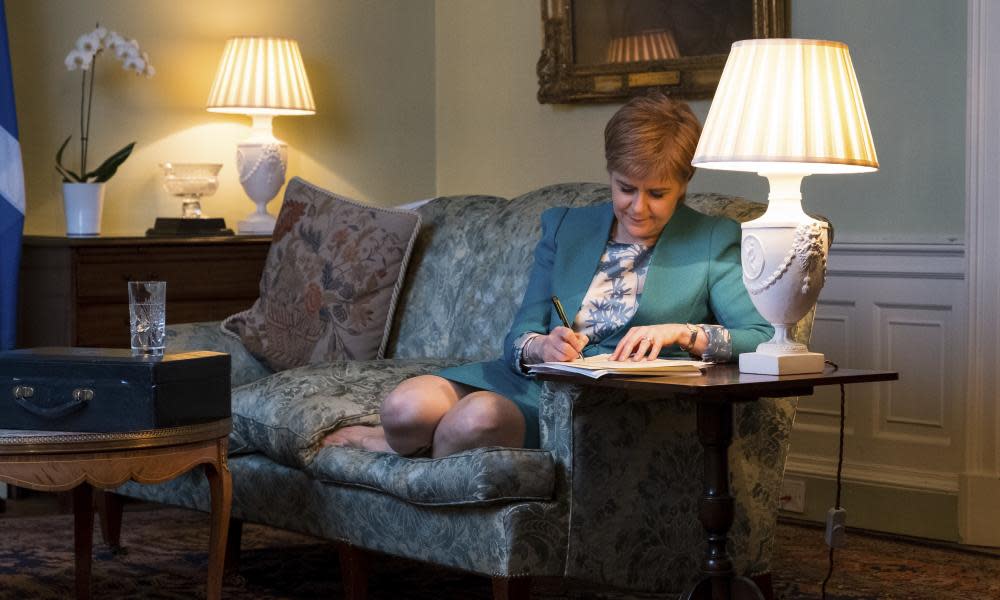Small business owners support Sturgeon's plans for another referendum

It’s been billed by critics as a vanity project for Scottish first minister Nicola Sturgeon, who wants independence from the rest of the UK whatever it takes. Theresa May has accused Sturgeon of “tunnel vision” and said her plans represented “the worst possible timing”.
But after the Scottish parliament voted in favour of holding a second independence referendum last week, it appears Scottish small business owners are also in favour of plans for another vote. Of the 145 entrepreneurs and self employed workers who responded to a Guardian request, 86% said they would support the move.
The majority of those who responded had voted yes to independence in the 2014 referendum and said they would vote yes again. But 12% of remain voters said they would change their vote given the opportunity and now support independence. On the flip side, only 2% who had voted yes before would switch their vote to no.
That number could be significant if representative. In the 2014 referendum, 45% voted for an independent Scotland and 55% voted to remain in the UK.
Before the 2014 vote, Scottish businesses were predominantly on the side of remaining in the United Kingdom – of the 1,000 entrepreneurs surveyed by Ingenious Britain, 48% believed it would be a negative step for their firm. It’s a shift too in opinion from May 2016, when a Federation of Small Businesses survey among 440 business owners in Scotland found 57% did not want a second independence vote in the next five years.
But the EU referendum result just a month later seems to have had an impact. A recent Opinium/Observer poll found that the majority (63%) of Scottish voters believe the Brexit vote has made the breakup of the United Kingdom more likely, against 16% who disagree.
In every way, socially, politically and economically, we are stronger in Europe
Carl MacDougall
Elizabeth Carnahan, founder of Gracefruit Ltd, voted no in 2014 because of the possibility of Scotland losing its EU membership, and would vote yes this time. She believes a good relationship with the EU is just as important to her business as one with the UK: “While we export a lot to the EU, we buy most of our components and raw materials from distributors within the UK (although most of these are imported from elsewhere). Leaving the single market would disrupt supply chains affecting many UK businesses, not just mine.”
Carnahan has found that political uncertainty has affected her business already. “We’ve had contact from worried EU customers who depend on our products for their own small businesses. [And] due to the falling value of the pound, we have seen significant price increases on most everything we buy.”
Corrado Mella, managing director of Scottish Broadband Telecom, voted in favour of independence in 2014 and would do so again in a second referendum. He believes the timing is important, but backs Sturgeon’s estimate of early 2019.
“The referendum must be held before the UK drops out of the free trade agreement and as soon as the Brexit terms are agreed and confirmed. It’s clear that trading with Europe, with cheap and easy transit and transport, is advantageous for SMEs. The same cannot be said for other overseas destinations.”
He does not believe that Scottish firms will have to choose between Europe and the UK if Sturgeon does get a mandate to remove Scotland from the union: “An independent Scotland, as an EU member, will trade with what’s left of the UK through the agreement reached by the two parties. [And] having a neighbouring Scotland in the EU provides a cheap and easy route to the EU markets [for the UK].”
Julie Inglis, director of KubeNet in Glasgow, is not in favour of a second referendum. She voted remain the first time around and says: “My personal opinion is that leaving the EU is a mistake, however given where we are, it’s now time to focus on creating sustainable employment, increasing manufacturing, and buying from within, as opposed to buying cheap from overseas.”
Brexit has already impacted her business: “The impact has been on procurement of hardware from some of the global vendors, [which] directly impacts our margins. Some of our customers have been hesitant in committing to investments, which has delayed projects slightly. [But] overall, the impact to our business so far is less than 10%.”
Carl MacDougall, a self-employed writer voted no in 2014 because “the economic case [for independence] was weak, important questions were unseen or avoided and the case mostly depended on an emotional, chauvinistic appeal.”
Now he would support independence: “In every way, socially, politically and economically, we are stronger in Europe. The special relationship with America mostly works one way. The pound is weak and looks vulnerable, unlike the euro. And the government case against Scottish independence – that it is divisive, playing politics with Britain’s future and likely to cause huge economic uncertainty – is equally applicable to Brexit.
“The Europe we were told needed us more than we needed them is better prepared for our exit than we are. We have an opportunity to stand alone with no one but ourselves to blame, to rid ourselves of the Little Englander attitude that tells us they know best ... What’s wrong with that? I imagine there are a few south of the border who are envious.”
Sign up to become a member of the Guardian Small Business Network here for more advice, insight and best practice direct to your inbox.

 Yahoo News
Yahoo News 
